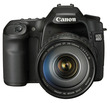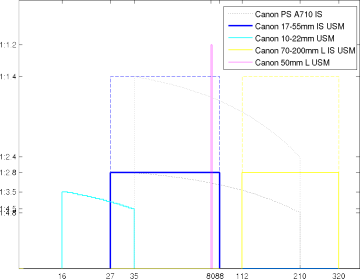Friday, September 21. 2007
Ultimate lens considerations, IV

I noticed that a 24-70mm lens definitely cannot be a standard walkaround lens for a 1.6× crop camera, as the equivalent 38mm are definitely not wide angle. I’d have to switch to the dedicated wide angle lens too often. Sure, my PowerShot also starts at only 35mm, but most compact cameras simply lack wide angle focal lengths. Therefore I was thinking about a lens that starts at 17mm or 18mm, what equals 27-28mm on a crop camera. There were several candidates, and I was struggling a lot, as each had its advantages and disadvantages. One promising candidate was the Canon EF 17-40mm f/4 L USM, but although it is a Luxury (L) lens and has an ultrasonic motor, it is rather slow and has no Image Stabilizer, what actually makes it a worse choice compared to the 24-105mm f/4 L IS USM that I was considering earlier. Competing lenses from other manufactures are faster and cheaper, but they lack an ultrasonic motor and are calculated for the APS-C circle only. In addition, the upper limit of 40mm would have made a dedicated 50mm lens almost inevitable.
 I finally broke it down to the Canon EF-S 17-55mm f/2.8 IS USM [Review] that I already had in mind earlier. It is definitely the best choice for a crop camera today. It is fast and has an Image Stabilizer, making it a perfect lens for portraits or available light photography. In addition, it has an ultrasonic motor. It could almost be considered as an L-series lens, but it isn’t, as it’s also just calculated for APS-C sensors. All in all it’s rather expensive at €1099, but I’ll definitely make use of it.
I finally broke it down to the Canon EF-S 17-55mm f/2.8 IS USM [Review] that I already had in mind earlier. It is definitely the best choice for a crop camera today. It is fast and has an Image Stabilizer, making it a perfect lens for portraits or available light photography. In addition, it has an ultrasonic motor. It could almost be considered as an L-series lens, but it isn’t, as it’s also just calculated for APS-C sensors. All in all it’s rather expensive at €1099, but I’ll definitely make use of it.
 And while I’m considering a Canon lens as primary lens, I now keep an eye on the Canon EF-S 10-22mm f/3.5-4.5 USM [Review] lens. I just prefer it to the Sigma because it’s a Canon, is a little faster and has a little wider focal length range. It has a bit more of a plastic feeling than the Sigma, but the minor weight is no disadvantage. It’s at €759 at my preferred dealer, and I’ll buy it sometime at the beginning of 2008 together with a tripod.
And while I’m considering a Canon lens as primary lens, I now keep an eye on the Canon EF-S 10-22mm f/3.5-4.5 USM [Review] lens. I just prefer it to the Sigma because it’s a Canon, is a little faster and has a little wider focal length range. It has a bit more of a plastic feeling than the Sigma, but the minor weight is no disadvantage. It’s at €759 at my preferred dealer, and I’ll buy it sometime at the beginning of 2008 together with a tripod.
![]() The tele lens, the tele lens. Sure, the Sigma would be a great choice, but why not taking a fast lens that additionally provides image stabilization? The Canon EF 70-200mm f/2.8 L IS USM [Review] is usable without a tripod and has some reserves for being used together with a teleconverter. Sure, it’s really expensive with €1999, that’s why I won’t buy it too soon, maybe in about one year.
The tele lens, the tele lens. Sure, the Sigma would be a great choice, but why not taking a fast lens that additionally provides image stabilization? The Canon EF 70-200mm f/2.8 L IS USM [Review] is usable without a tripod and has some reserves for being used together with a teleconverter. Sure, it’s really expensive with €1999, that’s why I won’t buy it too soon, maybe in about one year.
 I still want to have a dedicated fast portrait lens like the 50mm f/1.4 by Canon. But I also consider the great Canon EF 50mm f/1.2 L USM [Review]. It is very fast, provides a very narrow depth of field, and is rather expensive at €1369, but it’s really that good. We’ll see what my preferences will be. A flash might be more important for the first time.
I still want to have a dedicated fast portrait lens like the 50mm f/1.4 by Canon. But I also consider the great Canon EF 50mm f/1.2 L USM [Review]. It is very fast, provides a very narrow depth of field, and is rather expensive at €1369, but it’s really that good. We’ll see what my preferences will be. A flash might be more important for the first time.
The main reason for considering the f-stop of 1.2 or the IS for the other lenses is that my PowerShot also has an IS, what actually decreases the aperture values as if the lenses were faster. The following plot of focal length and aperture coverage of the desired lenses considers this by indicated dashed lines:
About
Calendar
| Mon | Tue | Wed | Thu | Fri | Sat | Sun |
|---|---|---|---|---|---|---|
| ← Back | February '26 | |||||
| 1 | ||||||
| 2 | 3 | 4 | 5 | 6 | 7 | 8 |
| 9 | 10 | 11 | 12 | 13 | 14 | 15 |
| 16 | 17 | 18 | 19 | 20 | 21 | 22 |
| 23 | 24 | 25 | 26 | 27 | 28 | |

Logbook of Stephan Paukner on : Wide angle views